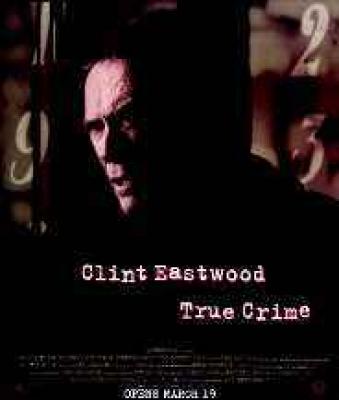
TRUE CRIME
US, 1998, 123 minutes, Colour.
Clint Eastwood, Isaiah Washington, James Woods, Denis Leary, Diane Venora, Bernard Hill, Mary Mc Cormack.
Directed by Clint Eastwood.
Clint Eastwood, star and director, seems to relish showing his age in this film. It takes place over one day or more when he, an almost-burnt out reporter, faces his conscience in realising that a black man on death row is innocent and he has to work desperately to prove it - to save the man and, he admits, to save himself. Movie buffs will be reminded of various versions of 'The Front Page', the caustic humour of the give and take of the press room (with James Wood as boss and a restrained Dennis Leary as editor) as well as the nose for a story that talented journalists successfully follow. Others will be reminded of 'Dead Man Walking' except that the execution is of an innocent man which pulls at our emotions.
The ingredients are familiar but Eastwood plays them both for character and themes as well as for intensity of action as the hours pass and the execution time closes in. Which means that it is quite effective as drama, as a thriller and as a movie which affirms our values.
1.Clint Eastwood and his career, interests, characters, issues? This film within his career?
2.The American city, the newspaper offices, homes, the zoo? Bars? The prison – interiors and exteriors? Authentic atmosphere? Musical score?
3.The title, its ironies? The truth about the crime and the criminal? The popular style of suspense novels and investigations?
4.The plausibility of the plot, Steve Everett and his having less than twenty-four hours to solve the case, newspaper reporters, executions, the pressures on the governor, investigation, the appeals, the work of detection? Saving the innocent man?
5.Clint Eastwood’s portrait of Steve, wrinkled Clint Eastwood, his newspaper career, his nose and hunches, his mistakes and reputation, the police, the law officers despising him? Alan and his support, Bob and his suspicious attitudes? With Michelle in the bar, talking to her, offering to drive her home, the crash? Blaming himself? His relationship with Bob’s wife – and his cavalier attitude, his relationship with his own wife and daughter, the phone call to Bob’s wife summoning him to the office?
6.Steve at the office, Alan and his attitude as the boss, his crass language? Bob and his antagonism? The secretary and her warnings, getting the coffee, the assistant and his getting information for Steve? Bob and his limiting the commission to an interview, not exploring more widely? Steve’s nose, returning to the office, the clashes with Bob, the confrontation about his wife, Alan and trust? The characters of editor and sub-editor, the staff? The workings of the paper? Deadlines, trust in articles and reporters?
7.Michelle, the information, the prospective interview, her death, Steve going to see her father, finding the documents, the address of the witness, Steve going to see the grandmother, discovering he was dead, seeing the photo of the murdered woman, the necklace, on the grandmother, his return and persuading her to testify?
8.The intercutting of Steve’s career with Frank and his being in prison, the sympathetic warden, the behaviour of the staff, the last day before the execution, different attitudes, protests outside the jail, the discussions about his final meal? The visit of his wife, his love for his daughter, the time with them, the daughter and the crayon, her drawings? The wife and Steve’s visit, and her accusation asking where he was in the past? Steve and his talking with Frank about guilt or innocence, believing him?
9.Steve approaching the DA, the law? The explanations, his career? The story about Frank, his past life of crime, drugs, the shooting? The visualising and reconstructions of the shooting? Frank and his having been born again? The businessman going into the shop, Steve interviewing him, the woman driving the car and their identifying Frank? Frank’s story, going to get the sauce, his knowing the girl, doing the repairs, student, pregnant, the discussion about the payment, his accepting the delay, going into the toilet, hearing the shot? Trying to revive her? His panicking, running, being identified by the witnesses? The fact that the real killer was a look-alike? The real killer coming forward as a witness – and then the news that he had died?
10.Steve, relationship with women, womanising, with his wife, her exasperation, love for his daughter, taking her to the zoo, the rapid visit, passing all the animals, her falling, the hospital? His discussions with his wife, the separation?
11.Steve and his nose, going to the crash site, going to the store and interviewing the woman there, the discussions with the witness, the information about the other witness, getting the address? The photo and the chain?
12.The timing, the close call, the hurry to the jail, the final walk for Frank, his wife’s grief, the witnesses assembling, the warning, the tying of Frank to the machine, the testing of the phones, the injection – and stopping the injections?
13.The aftermath, Steve and the Pulitzer Prize, his own life, recovering, sacked from the paper? Seeing Frank and the family and waving?
14.The theme of capital punishment, executions, guilt and innocence, protests and affirmation of the death penalty? Investigation, detection? Justice being done?